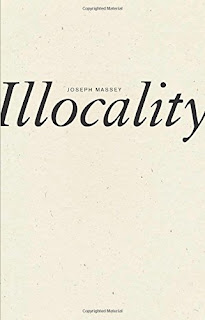The speed
at which sleep's
fogged dialogue withers
into the present
noun-scape
After drawing readers into the process by which the dream world resolves into ordinary life, Massey concludes,
What's seen
is dreamed
We think
ourselves here
That closing line sets the stage for Massey's 2015 collection, which portrays the poet thinking himself into awareness of a landscape that seems to flow through him onto the page. Massey's haiku-like evocations of place, season, and perception often open in the concrete and move toward gnomic conclusions. "Turned," for instance, paints a mountainscape on the page and ends by inviting readers
To walk into it--These poems focus lovingly on a particular place (the mountains of western Massachusetts) but present place as beauty always broken, the "Yellow centerline / split by roadkill" and the double-wide trailer "half-sheathed in ice" surrounded by blank whiteness, "Every other noun / frozen over." Massey echoes William Carlos Williams by declaring "No ideas / but in parking lots," but he expresses a difficulty in making these cold, blank landscapes speak.
breathe the frequencies
that knot the air, another
animal baffled
to be an animal.
"The Span," for instance, seems to offer simple instructions for writing about place:
Start with
a map, a sheet
of paper
Thinking
is site-specific
And "Contain" suggests that the act of writing releases a place's latent energy:
No
world without
delineation. No
thing until
detonated
into its word.
However, this detonation depends upon the erratic perceptions of the poet, a problem explored in the long poem "Take Place," one of Massey's two-faced titles: does "Take Place" refer to a happening or an act of possession--or both? Here he succinctly demonstrates the tenuous connection between word and world:
Between sidewalk and curb
tiger lilies flare and bend
--a shape that resembles
the shape of the thought
that found them
there.
Thoughts and presumptions aim the poet's perception toward a shape resembling thought: how can a poem so far from the concrete nevertheless immerse readers in a world that feels solid as ice?
Another long poem, "An Interim," points to weeds sheathed in ice and embankments with mud but confesses the difficulty of the poet's task:
To speak, to point
To account for anything
in the drift
The weight--the weightlessness--of it
Massey's slim book carries that weight, dense with lines that hand readers clods of mud and shards of ice yet pointing toward ideas weightless and ephemeral as flame. Often, the landscape itself serves as subject of sentences, as in "Easter (2)":
a world this one
ignites on a word
and the landscape uncoils
hinged to a name
Landscape and world act independently, igniting and uncoiling onto the page. These poems may appear under Massey's name, but he suggests repeatedly that they spontaneously combusted onto the page through a partnership of poet, place, and language. The poems present Massey in the act of reading his world, admitting that "the yard's the only news on." Fortunately, it's the kind of news that remains fresh and timeless despite being tethered to particular places, seasons, and perceptions.

No comments:
Post a Comment